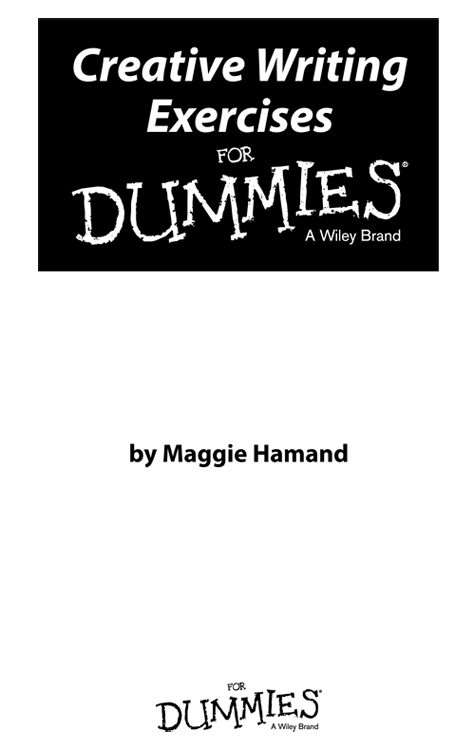
Creative Writing Exercises For Dummies
Published by: John Wiley & Sons, Ltd., The Atrium, Southern Gate, Chichester, www.wiley.com
This edition first published 2014
2014 Maggie Hamand
Registered office
John Wiley & Sons Ltd, The Atrium, Southern Gate, Chichester, West Sussex, PO19 8SQ, United Kingdom
For details of our global editorial offices, for customer services and for information about how to apply for permission to reuse the copyright material in this book please see our website at www.wiley.com .
The right of the author to be identified as the author of this work has been asserted in accordance with the Copyright, Designs and Patents Act 1988
All rights reserved. No part of this publication may be reproduced, stored in a retrieval system, or transmitted, in any form or by any means, electronic, mechanical, photocopying, recording or otherwise, except as permitted by the UK Copyright, Designs and Patents Act 1988, without the prior permission of the publisher.
Wiley publishes in a variety of print and electronic formats and by print-on-demand. Some material included with standard print versions of this book may not be included in e-books or in print-on-demand. If this book refers to media such as a CD or DVD that is not included in the version you purchased, you may download this material at http://booksupport.wiley.com . For more information about Wiley products, visit www.wiley.com .
Designations used by companies to distinguish their products are often claimed as trademarks. All brand names and product names used in this book are trade names, service marks, trademarks or registered trademarks of their respective owners. The publisher is not associated with any product or vendor mentioned in this book.
LIMIT OF LIABILITY/DISCLAIMER OF WARRANTY : WHILE THE PUBLISHER AND AUTHOR HAVE USED THEIR BEST EFFORTS IN PREPARING THIS BOOK, THEY MAKE NO REPRESENTATIONS OR WARRANTIES WITH THE RESPECT TO THE ACCURACY OR COMPLETENESS OF THE CONTENTS OF THIS BOOK AND SPECIFICALLY DISCLAIM ANY IMPLIED WARRANTIES OF MERCHANTABILITY OR FITNESS FOR A PARTICULAR PURPOSE. IT IS SOLD ON THE UNDERSTANDING THAT THE PUBLISHER IS NOT ENGAGED IN RENDERING PROFESSIONAL SERVICES AND NEITHER THE PUBLISHER NOR THE AUTHOR SHALL BE LIABLE FOR DAMAGES ARISING HEREFROM. IF PROFESSIONAL ADVICE OR OTHER EXPERT ASSISTANCE IS REQUIRED, THE SERVICES OF A COMPETENT PROFESSIONAL SHOULD BE SOUGHT.
For general information on our other products and services, please contact our Customer Care Department within the U.S. at 877-762-2974, outside the U.S. at (001) 317-572-3993, or fax 317-572-4002. For technical support, please visit www.wiley.com/techsupport .
For technical support, please visit www.wiley.com/techsupport .
A catalogue record for this book is available from the British Library.
ISBN 978-1-118-92105-0 (pbk); ISBN 978-1-118-92106-7 (ebk); ISBN 978-1-118-92107-4 (ebk)
Printed in Great Britain by TJ, Padstow, Cornwall
10 9 8 7 6 5 4 3 2 1
About the Author
Maggie Hamand is the author of two novels, The Resurrection of the Body and The Rocket Man, and has published a number of short stories, some of which have been nominated for prizes. Shes the author of 18 non-fiction books, and her articles have appeared in magazines and newspapers including the Guardian, The Sunday Times and the Observer. She taught creative writing in Holloway Prison and Morley College, and also founded The Complete Creative Writing Course at the Groucho Club in 1998. She was co-founder of the award-winning small independent publisher The Maia Press and a director from 20032012.
Authors Acknowledgements
Id like to thank all the people who supported and encouraged me while writing this book especially my husband, Jeremy.
Special thanks also go to the other tutors on The Complete Creative Writing Course, past and present, from whom Ive learned so much. I especially thank Rachel Knightley for helping me with research and contributing to the typescript in places, and to Natalie Butlin for the original draft of the dialogue in Chapter .
Publishers Acknowledgements
Project Manager: Michelle Hacker
Project Editor: Steve Edwards
Acquisitions Editor: Mike Baker
Development Editor: Andy Finch
Copy Editor: Mary White
Technical Editor: Howard Cunnell
Project Coordinator: Sheree Montgomery
Cover Image: istock.com/mrPliskin
Chapter 1
Preparing to Create Your Written Masterpiece
In This Chapter
 Starting your creative writing
Starting your creative writing
 Thinking about the process
Thinking about the process
 Embracing confusion
Embracing confusion
The saying goes that all people have a book inside them. Certainly, all people have their own life stories and many want to write theirs down; everybody has dreams, ideas, hopes and fears, as well as a certain amount of imagination. All that most people lack is the courage and know-how to turn their chosen idea into a story that others want to read.
Many people think that if you want to be a writer, you have to leave your job (or never start one!) and sit all day in a freezing garret. In fact, most writers have other jobs as well because they have to! Writers write in bed in the mornings before anyone else is awake, they stay up late writing when everyone else has gone to bed, they write on their commute to work, they write in their lunch hours, they write in any small bit of time they have. They write because they want to and because they have something unique to say while still paying the bills in other ways.
Being passionate about what you write is important, because otherwise youre highly unlikely to find the energy and commitment to finish. A story needs to be burning inside you, wanting to escape. You should love your characters, be fascinated by your themes and want to find out how your story ends.
But good writing is more than just a passion its also a craft. You need to discover the techniques and tips of the trade and then practise them to help you make the project you have in mind as good as it can possibly be which is where this book and this introductory chapter come in! I lead you through some things to consider before you start writing and discuss the basics of creative writing and creative thinking.
Planning for the Writing Journey
Before you physically start writing, a little preparation is a good idea to get the best out of the valuable time you devote to your writing. In this section I discuss helpful ideas such as setting targets and staying confident, as well as how much you do or dont need to think about genre, scope and the title of your work before you start writing.
Setting your writing goals
One of the most helpful things you can do when starting any writing project is to set yourself some simple, realistic and achievable goals and targets. Here are a few examples:
- Task targets: Such as developing a character, finishing a chapter or planning a scene.
- Time targets: A certain number of writing sessions of fixed length, such as three half-hour sessions a week.
- Word targets: A certain number of words or pages, such as 500 words or three pages per week.
None of these targets sounds like much, but you may be surprised how much you achieve if you keep going with them week after week.

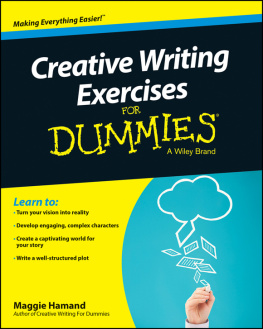
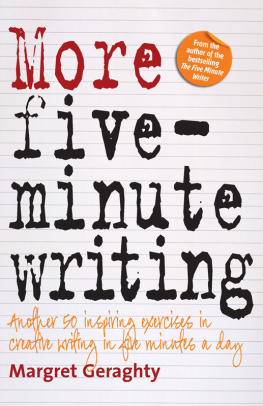
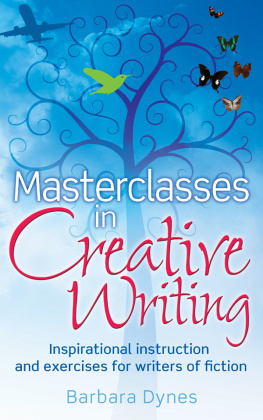

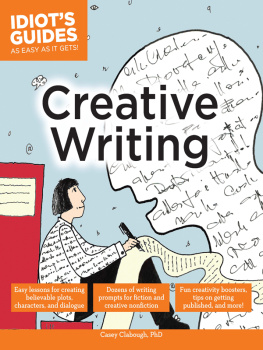
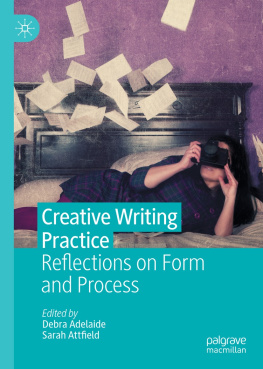

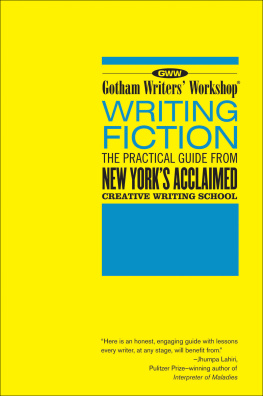

 Starting your creative writing
Starting your creative writing